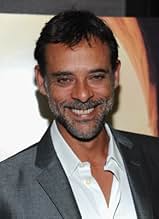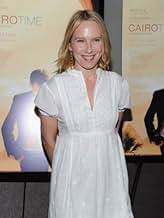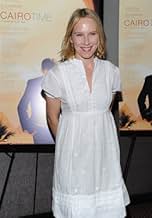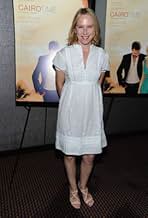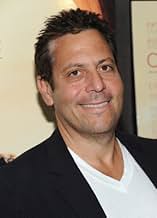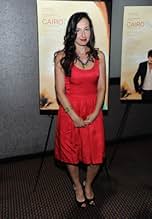IMDb रेटिंग
6.6/10
7 हज़ार
आपकी रेटिंग
अपनी भाषा में प्लॉट जोड़ेंA romantic drama about a brief, unexpected love affair that catches two people completely off-guard.A romantic drama about a brief, unexpected love affair that catches two people completely off-guard.A romantic drama about a brief, unexpected love affair that catches two people completely off-guard.
- पुरस्कार
- 2 जीत और कुल 2 नामांकन
Mohamed Abdel Fatah
- Customs Officer
- (as Mohammed Abdel Fattah)
फ़ीचर्ड समीक्षाएं
Québécois writer and director Ruba Nadda favors stories that deal with love between Muslim and non-Muslim and her latest film CAIRO TIME follows that path - to an extent. According to Nadda she views this film as a 'luscious, serene, languid romance', a story that crosses two unlikely and emotionally unavailable people who approach momentary bliss in the beauty of Cairo. It is a slow film, the type of movie that encourages the viewer to sit back and enjoy an adult romance.
Juliette Grant (Patricia Clarkson) arrives in Cairo for a vacation with her UN employee husband Mark (Tom McCamus) only to discover that Mark is in Gaza on 'business': she discovers the information from a retired ex-assistant to Mark, Tareq Khalifa (Alexander Siddig), who offers her honest companionship until Mark returns. Tareq now owns a coffee house and spends his days playing chess. Juliette meets Kathryn (Elena Anaya), another associate of Mark, who offers her company, but Juliette prefers to be alone. The magic of Cairo - the smells, the muezzin calls to worship, the street shops, the sunsets - all begin to work on Juliette's lonely mood and she wanders into the city, fends off young men's attentions, and encounters Tareq in his coffee house (a men only club). Tareq offers to show her Cairo, especially the pyramids, but Juliette says she promised Mark to share those with him. A trip down the Nile and walks in the fascinating city draw Juliette and Tareq together, and when the two encounter Yasmeen (Amina Annabi), a friend and ex-lover of Tareq, the two are invited to Yasmeen's daughter's wedding in Alexandria. Telephone calls from and to Mark reveal that Mark will be delayed in Gaza, and after Juliette makes an attempt to travel to Gaza to see Mark and is prevented by the military she returns to Cairo, determined to make the best of her extended stay there. She goes to Alexandria with Tareq, they enjoy the wedding, and when they return to Cairo they mutually decide to visit the pyramids. The magic is there and the longing between them is palpable, but as soon as they return, Mark appears at the hotel. The Cairo time is over and the viewer is left guessing how the emotions generated by the time and place will play out.
Among the many lovely details of this film are views about the gender barriers in the Middle East and the customs of a city that, while modern, is still a culture of men. As Juliette and Tareq wander the streets of Cairo we recognize subtleties that exist, subtleties that director Nadda never forces. The gorgeous cinematography is by Luc Montpellier and the musical score is by Niall Byrne. This film is more a poem than a story, a welcome change from the usual youngster-oriented love stories and more of a mature episode of ageless flirtation. Grady Harp, August 10
Juliette Grant (Patricia Clarkson) arrives in Cairo for a vacation with her UN employee husband Mark (Tom McCamus) only to discover that Mark is in Gaza on 'business': she discovers the information from a retired ex-assistant to Mark, Tareq Khalifa (Alexander Siddig), who offers her honest companionship until Mark returns. Tareq now owns a coffee house and spends his days playing chess. Juliette meets Kathryn (Elena Anaya), another associate of Mark, who offers her company, but Juliette prefers to be alone. The magic of Cairo - the smells, the muezzin calls to worship, the street shops, the sunsets - all begin to work on Juliette's lonely mood and she wanders into the city, fends off young men's attentions, and encounters Tareq in his coffee house (a men only club). Tareq offers to show her Cairo, especially the pyramids, but Juliette says she promised Mark to share those with him. A trip down the Nile and walks in the fascinating city draw Juliette and Tareq together, and when the two encounter Yasmeen (Amina Annabi), a friend and ex-lover of Tareq, the two are invited to Yasmeen's daughter's wedding in Alexandria. Telephone calls from and to Mark reveal that Mark will be delayed in Gaza, and after Juliette makes an attempt to travel to Gaza to see Mark and is prevented by the military she returns to Cairo, determined to make the best of her extended stay there. She goes to Alexandria with Tareq, they enjoy the wedding, and when they return to Cairo they mutually decide to visit the pyramids. The magic is there and the longing between them is palpable, but as soon as they return, Mark appears at the hotel. The Cairo time is over and the viewer is left guessing how the emotions generated by the time and place will play out.
Among the many lovely details of this film are views about the gender barriers in the Middle East and the customs of a city that, while modern, is still a culture of men. As Juliette and Tareq wander the streets of Cairo we recognize subtleties that exist, subtleties that director Nadda never forces. The gorgeous cinematography is by Luc Montpellier and the musical score is by Niall Byrne. This film is more a poem than a story, a welcome change from the usual youngster-oriented love stories and more of a mature episode of ageless flirtation. Grady Harp, August 10
Cairo Time is an exquisite feast for the eyes, ears and eventually, the heart. Ruba Nadda takes us on a tour of Cairo which flows so well because it appears complete even down to such minute details such as showing street children selling bobby pins, a wild motorcycle driver nearly hitting the film's heroine, and Egyptian hit songs playing on a taxi's radio. In contrast with the high energy scenes of Cairo's bustling city life are dreamy, beautifully composed shots of the city's classical architecture, the Egyptian pyramids and The White Desert, all which give the impression that they are frozen in time. But, the time in Cairo Time is hardly stagnant. The film's stunning images, rich music and moving love story about a bored workaholic Canadian married woman whose passion for love and life is awoken by her relationship with a Egyptian man interplay so beautifully that the film appears seamless. Patricia Clarkson (Juliette) and Alexander Siddig (Tareq) convincingly play a couple whose professional relationship transforms into a love relationship over time. Both actors show off their fine acting skills by expressing the characters' love for each other through their subtle uses of body language and eye contact. Each views the other as a kind of "forbidden fruit", yet neither one can hide their desire for the other. The quiet intensity of their passion is almost deafening. Cairo Time works because it does so well what many other contemporary films don't do. It takes you to another place and time, one of the main reasons we go to the movies.
I've known Alexander Siddig from playing Dr. Bashir on "Star Trek; Deep Space Nine". I've seen Patricia Clarkson in "Jumanji" and "Vicky Christina Barcelona". Both these two actors unite to give us a very touching love story set in the background of Cairo.
Egypt is a timeless land that has had history's touch upon it even as it enters the new millennium. People's lives are bound to the countryside as well as the old cities modernized with technology. Ruba Nadda, a young Canadian film maker, has set her newest story in the city of Cairo. It concerns the clash of two very different cultures, and how the past and present collide to form such a layered city as Cairo. As well as showing us wonderful scenes within the city, we are given exceptional cinematography of the surrounding countryside. The White Desert and the Pyramids stand out, etched out in the land, seemingly by giants who preceded modern civilization.
The film follows Juliette, a middle-aged woman arriving in Egypt. She would have been with her husband, but he is away on a mission for the UN. Her two children have grown up and have moved into adult phases of their lives. She is left to see the city by herself, aided by an old friend of her husband's: the middle-aged Egyptian Tariq, a retired policeman who now owns a coffee shop in Cairo. He helps Juliette out of his friendship to the absent Mark, and Juliette is intrigued by this soft-spoken man. Their feelings inevitably grow into affection, but the gradual steps taken to that stage is what makes the movie so tender and well made. Juliette's explorations of Cairo and the people that live within its shadow give us a view into the foreign culture that lies waiting to be discovered.
If Juliette must carry the movie, she is supported by some well-made characters. Tariq is clearly the prominent of these, but there is also Yasmeen, the former love interest of Tariq who wants to rekindle the relationship, and Kathryn, a kindly woman who leads Juliette on a trip in the White Desert outside of the city. And of course, there is the ever absent Mark, who is continually held away from his wife.
To say that this is a sentimental piece that tugs on heart-strings is redundant. However, it has a life of its own beyond the stereotypes of the genre, brought about by the fantastic chemistry between Patricia Clarkson and Alexander Siddig. The two of them are professional actors and give us a love story that rivals the epic romance "Out of Africa" or the low-key "Lost in Translation".
Ruba Nadda also provides us with a well-written script that feels natural to the actors' tongues and the audience's ears. The mood of the film seems whimsical and light-hearted, especially during the scenes between the two leads, but there is a serious undertone played into the film. Questions are silently presented, aimed against such themes as love, fidelity, culture, and loneliness. Both characters are certainly lonely: Tariq has isolated himself from those that loved him, withdrawing into a kind of politeness that seems to discourage intimacy, while Juliette is isolated from her friends, her work, children, and her husband. Both need human contact, even as both must come to terms with their lives and what has come out of it all.
This small Canadian production has received a number of positive reviews, and has also won the Best Canadian Feature Award at the Toronto Film Festival. While I have certainly not seen all the Canadian films this year, I can definitely say that this was worthy of such an award. English Canadian cinema is so over-shadowed by Hollywood that one wonders if such cinema exists when compared to Quebec's film industry. However, once in a while, one can find such gems as this production, and be content to know that being Canadian means laying claim to truly great films such as this one.
Egypt is a timeless land that has had history's touch upon it even as it enters the new millennium. People's lives are bound to the countryside as well as the old cities modernized with technology. Ruba Nadda, a young Canadian film maker, has set her newest story in the city of Cairo. It concerns the clash of two very different cultures, and how the past and present collide to form such a layered city as Cairo. As well as showing us wonderful scenes within the city, we are given exceptional cinematography of the surrounding countryside. The White Desert and the Pyramids stand out, etched out in the land, seemingly by giants who preceded modern civilization.
The film follows Juliette, a middle-aged woman arriving in Egypt. She would have been with her husband, but he is away on a mission for the UN. Her two children have grown up and have moved into adult phases of their lives. She is left to see the city by herself, aided by an old friend of her husband's: the middle-aged Egyptian Tariq, a retired policeman who now owns a coffee shop in Cairo. He helps Juliette out of his friendship to the absent Mark, and Juliette is intrigued by this soft-spoken man. Their feelings inevitably grow into affection, but the gradual steps taken to that stage is what makes the movie so tender and well made. Juliette's explorations of Cairo and the people that live within its shadow give us a view into the foreign culture that lies waiting to be discovered.
If Juliette must carry the movie, she is supported by some well-made characters. Tariq is clearly the prominent of these, but there is also Yasmeen, the former love interest of Tariq who wants to rekindle the relationship, and Kathryn, a kindly woman who leads Juliette on a trip in the White Desert outside of the city. And of course, there is the ever absent Mark, who is continually held away from his wife.
To say that this is a sentimental piece that tugs on heart-strings is redundant. However, it has a life of its own beyond the stereotypes of the genre, brought about by the fantastic chemistry between Patricia Clarkson and Alexander Siddig. The two of them are professional actors and give us a love story that rivals the epic romance "Out of Africa" or the low-key "Lost in Translation".
Ruba Nadda also provides us with a well-written script that feels natural to the actors' tongues and the audience's ears. The mood of the film seems whimsical and light-hearted, especially during the scenes between the two leads, but there is a serious undertone played into the film. Questions are silently presented, aimed against such themes as love, fidelity, culture, and loneliness. Both characters are certainly lonely: Tariq has isolated himself from those that loved him, withdrawing into a kind of politeness that seems to discourage intimacy, while Juliette is isolated from her friends, her work, children, and her husband. Both need human contact, even as both must come to terms with their lives and what has come out of it all.
This small Canadian production has received a number of positive reviews, and has also won the Best Canadian Feature Award at the Toronto Film Festival. While I have certainly not seen all the Canadian films this year, I can definitely say that this was worthy of such an award. English Canadian cinema is so over-shadowed by Hollywood that one wonders if such cinema exists when compared to Quebec's film industry. However, once in a while, one can find such gems as this production, and be content to know that being Canadian means laying claim to truly great films such as this one.
Cairo Time could be the solution to the date movie, so subtle and full of empathy it has no time for anything that might embarrass the person you are with and you'll have something to talk about later. I saw it alone for logistical reasons, but from the middle of the second row it was quite emersive. I'm no Cairofile; all I know is that the place has pyramids and a funny word for the water pipes they smoke. Those things are touched upon, but the movie avoids becoming a travelogue. Patricia Clarkson (The Green Mile) arrives for a vacation with her United Nations honcho husband Mark only to find he isn't there. He'll be busy in Gaza for a while (which is never played for a joke although we get the idea that settling things in Gaza could take a while). Alexander Siddig (Dr. Bashir from Star Trek: Deep Space Nine) a former co-worker of Mark meets her instead and acts as a guide where he can. He would show her the pyramids right away, but she has promised her husband to see them for the first time with him. We might be able to guess where this is heading, but the surprise is that scenes that might not read as 2009 ADD generation content is actually loaded and engaging. We are waiting for tea to steep and not getting bored. Clarkson takes on more of a glow as the movie goes on, but in the early scenes it is her character Juliette's vulnerability that has our focus. A bunch of random flirtations from guys on the street might be a minor irritant in the USA or Toronto's Annex neighbourhood, but here there is a growing sense of jeopardy which reinforces the bubble of trust Siddig's character creates. For another character to burst that bubble by violating the camera frame with a sudden lunge from the teaming masses would be a shame, an intrusion of reality. And yet the film is very realistic as to the unexpressed aspect of life that can turn a bland setting into a postcard perfect image depending who you are with. The director Ruba Nadda spoke after the Varsity cinema screening I attended and it is remarkable that amid the strategies needed to pull off this movie she managed to maintain such a subtle focus. It is nice that also Christine Vachon's brand is there as a producer to suggest how subtlety in a movie might even be considered quirky. But it definitely has the patience and quiet faith in detail that mark Ruba Nadda's previous movie Sabah. I would love to read a diary publication about the making of Cairo Time. From content to execution it is apparently a film only Ruba could have made - it has both ethnic trappings with gravitas and an accessible romantic, dramatic structure of entertainment.
I enjoyed seeing the movie, but it is hard to describe why in words. Is it the music, the scenes of Cairo, the magical pyramids, the performance of the actors, the unhurried pace? I don't know why I enjoyed the movie so much. Not one part of the movie is that spectacular. I grew up in the Middle East and heard the beautiful voice of Um Kalthoum a thousand times, encountered the sexual harassment on the streets and seen busy bazaars. Nothing in the movie was such a surprise for me. Yet somehow when you put all these elements together with the fantastic actors, it just works. I left movie theatre feeling uplifted and optimistic. The movie is visual poetry.
क्या आपको पता है
- ट्रिवियाAlthough playing an Egyptian, Alexander Siddig hails from Sudan (although his mother is English).
- गूफ़The position of the women during the wedding sequence changes constantly.
- भाव
Juliette Grant: I always wanted to be a singer.
Tareq Khalifa: What stopped you?
Juliette Grant: My voice.
- कनेक्शनFeatured in The Rotten Tomatoes Show: Despicable Me/The Kids Are All Right (2010)
- साउंडट्रैकLet's Go
Performed by Catlow
Written by Natasha Thirsk and Brian Carson(SOCAN/ASCAP)
Published by Dirtmitts Publishing
टॉप पसंद
रेटिंग देने के लिए साइन-इन करें और वैयक्तिकृत सुझावों के लिए वॉचलिस्ट करें
- How long is Cairo Time?Alexa द्वारा संचालित
विवरण
बॉक्स ऑफ़िस
- US और कनाडा में सकल
- $16,03,616
- US और कनाडा में पहले सप्ताह में कुल कमाई
- $66,245
- 8 अग॰ 2010
- दुनिया भर में सकल
- $24,77,315
- चलने की अवधि1 घंटा 30 मिनट
- रंग
- ध्वनि मिश्रण
- पक्ष अनुपात
- 2.35 : 1
इस पेज में योगदान दें
किसी बदलाव का सुझाव दें या अनुपलब्ध कॉन्टेंट जोड़ें




